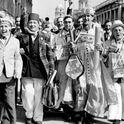England have qualified in style for the 2010 World Cup in South Africa, but there are no shortage of Cassandras predicting that the tournament itself will be a disaster. One throws a longer and gaunter shadow than the rest: the west London oracle, that venerable sports journalist Brian Glanville. Consistent and relentless, he opposed South Africa before Fifa awarded it hosting rights in 2004, after they won their bid, and at every step since. As the opening game approaches his tone rises to a new pitch of rhetorical fury. His pronouncement in the August issue of World Soccer magazine simply heralded the “impending chaos to come.”
Reading the entrails of this summer’s Fifa Confederations Cup—held in South Africa, and a kind of small-scale dry run for the World Cup—and adding his own special bile, his case against South Africa comes down to four things. First, the stadiums have soared in cost, and will leave a legacy of white elephants. Second, transport links between the cities are poor. Third, hotel space is limited. Fourth, there is a lot of crime.
The stadiums have soared in cost—you don’t say! On these grounds no mega-sporting event would ever be held anywhere. The South African state has no monopoly on these planning vices. That said, all stadiums will be finished on time, and all 64 games will be played when and where they were planned.
Transport certainly is an issue. Many inter-city roads are narrow and unlit, and public transport to some stadiums looks problematic. But Glanville has little concern and no empathy with the ordinary South Africans who put up with this every day of their lives. The fact that a couple of journalists had a tricky night drive does not amount to an argument; it amounts to a complete failure of perspective. The World Cup isn’t laid on just for the convenience of football journalists and tourists from the global north, both accustomed to a luxury travel package.
The same goes for hotels. It’s not going to be like the multinational business conference that was Germany’s 2006 World Cup or the beered-up, sun-drenched summer holiday camp that was Portugal’s Euro 2004. We are, thankfully, going to the global south—where most of the world lives, and things work slightly differently. Get planning, and get used to it. Which leaves the question of crime. Over the past few years Glanville-the-oracle has been keeping tabs on South Africa’s crime figures. He has a particular interest in the appalling figures for rape and murder, among the world’s worst. But the vast majority of these victims are poor black South Africans, often women and girls. Does the oracle imagine that for the month of July 2010 South Africa will suspend its psychosexual crisis and unleash its full fury only on travelling German or English fans? This is scaremongering of the worst and most ignorant kind.
Yes, there are thieves, pickpockets and dodgy taxi drivers out there. To that extent the English fans will be at home. And yes, visitors will have to think carefully about their behaviour, and their state of inebriation. This seems to be a rather good thing.
If the World Cup is anything at all, it is humanity’s singular global festival of play: a celebration of universalism and cosmopolitanism. The decision to give it to South Africa was not irresponsible, but inspirational. The world’s commitment to Africa means more than handouts and lectures; it requires engagement by individuals and institutions on Africa’s terms, as well as ours. Glanville has been generous in his praise for African football and footballers. It is time that he, and others, extended that generosity to the people of Africa.

Ooh! Aah! South Africa!
Commentators who say that the 2010 World Cup will be a fiasco are ungenerous and wrong
September 23, 2009











